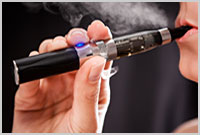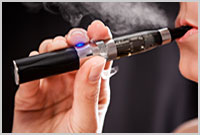 A review published Friday in The New England Journal of Medicine draws no conclusions about which compound or compounds associated with the use of electronic vaporization products are the cause of more than 450 cases of lung illness recently reported. The US Centers for Disease Control similarly affirms, “No single product [has been] linked to all cases .” While initial cases of the phenomenon were associated with “consumption of cannabinoid oil products via the use of unregulated vapor cartridges, the CDC reports that some cases have also been linked to the use of nicotine only.”
A review published Friday in The New England Journal of Medicine draws no conclusions about which compound or compounds associated with the use of electronic vaporization products are the cause of more than 450 cases of lung illness recently reported. The US Centers for Disease Control similarly affirms, “No single product [has been] linked to all cases .” While initial cases of the phenomenon were associated with “consumption of cannabinoid oil products via the use of unregulated vapor cartridges, the CDC reports that some cases have also been linked to the use of nicotine only.”
Three people have died as a result of the illness, and a fourth death is under investigation.
In New York State, where 34 cases have been reported, health officials reported the identification of “very high levels of vitamin E acetate in nearly all cannabis-containing samples analyzed.” The inhalation of vitamin E oil has previously been linked with lipoid pneumonia. Medical reports have previously identified an association between vitamin E oil exposure and the vaping of both cannabis and nicotine liquid products, according to a NBC News investigative report. Reporting by Leafly.com suggests that additives may be introduced to unregulated oil products in an effort to thicken their consistency and to mask dilution.
The New York Health Department bulletin warns: “Anyone using vape products should never use unregulated products purchased ‘off the street.’ … These unregulated products are not tested and may contain harmful substances.” The agency has posted pictures of some of the products linked to the ailments here.
NORML reiterated its consistent call for greater regulation, standardization, and oversight of the cannabis market. NORML’s Deputy Director Paul Armentano said: “These unfortunate incidents reinforce the need for consumers to be aware that not all products are created equal; quality control testing is critical and only exists in the legally regulated marketplace.”
Although only limited data exists assessing the safety of vaporized cannabinoid oil products, researchers at San Francisco General Hospital on non-disposable vaporization devices reported that use of the Volcano vaporizing device did “not result in [subjects’] exposure to combustion gases.” The authors concluded, “The Volcano [vaporizer] device is an effective and apparently safe vehicle for THC delivery.” In another study, Dutch researchers similarly reported, “Our results show that with the Volcano a safe and effective cannabinoid delivery system seems to be available to patients. The final pulmonal uptake of THC is comparable to the smoking of cannabis, while avoiding the respiratory disadvantages of smoking.”
The latest update from the CDC is online here. The bulletin from the New York State Department of Health is online here. Ongoing reporting from Leafly.com is online here.


